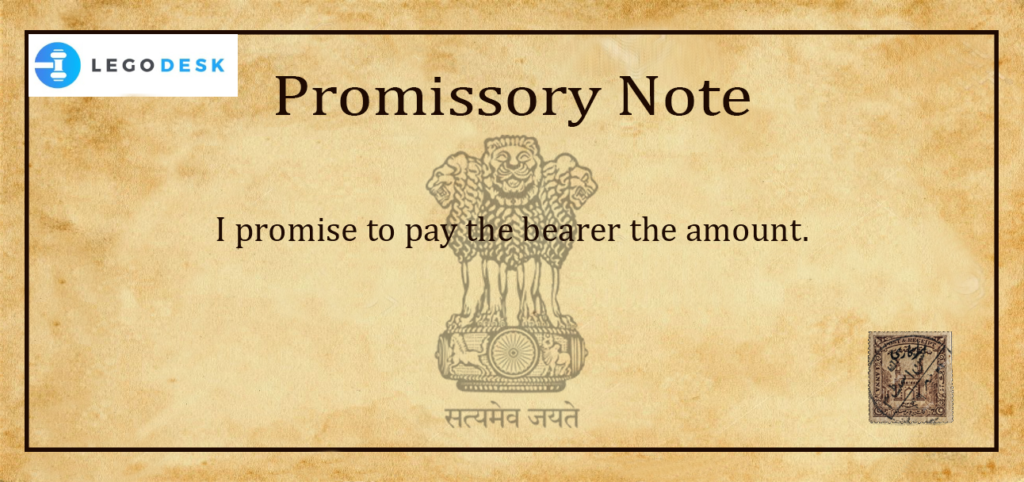Promissory Note Meaning in India

Promissory Note Meaning in India
A promissory note in India sometimes alluded to as a note payable, is a legal instrument, in which one party (the issuer) guarantees or promises in writing to pay a determinate amount of cash to the other (the payee), either at a fixed or definable future time or on demand of the payee, under particular terms.
The terms of a note, as a rule, incorporate the principal amount, the interest rate if any, the parties, the date, the terms of repayment and the maturity date. In some cases, provisions are incorporated concerning the payee’s rights in case of a default, which may incorporate abandonment of the issuer’s assets. For loans between people, writing and signing a promissory note is frequently instrumental for tax and record keeping. A promissory note alone is normally unsecured.
Read Also – Mortgage: A Short Note
A note is of two kinds secured and unsecured promissory note. An unsecured promissory note isn’t attached to anything; the loan is made dependent on the issuer’s capacity to repay. A secured promissory note may likewise be made dependent on the issuer’s capacity to repay, however, it is secured by a thing of value, for example, a vehicle or a house.
If your house is utilized for security and you default on the note, you could lose your home. Most promissory notes joined to a property are secured by either a trust deed, a mortgage or a land contract, and those instruments are recorded in public records. Promissory notes are often unrecorded.
Necessities of a promissory note:
(a) the document must contain an unconditional undertaking to pay;
(b) the undertaking must be to pay money only;
(c) the money to be paid must be certain;
(d) it must be payable to or to the order of someone in particular or to bearer;
(e) the record must be signed by the creator.
In India, Section 4 of the Negotiable Instruments Act, 1881 characterizes the expression.
In Bolisetti Bhavannarayana @ … versus Kommuru Vullakki Cloth Merchant, the court settled on whether a suit document is a promissory note?
It was held: ‘ As to the first question, we may remind ourselves of the fact that the Indian Stamp Act, 1899, levies stamp duty on various documents at varying rates and, therefore, it becomes necessary first to determine the nature of any document before deciding the question of proper stamp duty payable on such document. Accordingly, the definition of a ‘bond’ or a ‘promissory note’ as given in the Stamp Act alone is material for the purpose of determination of the nature of any document. Section 2(22) of the Stamp Act defines ‘promissory note’ as follows:
Promissory note meanings can be defined by the Negotiable Instruments Act, 1881.
“It also includes a note promising the payment of any sum of money out of any particular fund which may or may not be available, or upon any condition or contingency which may or may not be performed or happen.”
In the context of this definition of “promissory note” given in Section 2(22) of the Stamp Act, the definition of the term as given in the Negotiable Instruments Act, 1881 assumes importance.
The promissory note is not an obligatorily attestable document:
Typically no attestation is required to execute a promissory note. In Chandabolu Bhaskara Rao’s case, the Hon’ble High Court of A.P held that ‘
Read Also – Debit Note and Credit Note in GST
Since the promissory note is not a compulsorily attestable document, even if the signatures of the attesters are taken, after its execution it does not amount the material alteration, and so it does not get vitiated. Therefore, whether there were attesters or not at the time of its execution is immaterial, more so when its execution is admitted.
Read Also: Gazetted Officer for Document Attestation
Important points about Promissory Notes:
- Promissory Notes issued in one Indian state can be used in another state given that the note bears the valid stamp. There is no necessity for extra stamp duty to be paid.
- It should always be composed by hand. It must incorporate all the required components, for example, the legal names of the payee and issuer’s name, the sum being loaned/to be repaid, full terms of the agreement, apart from other components.
- The note should obviously contain just the promise of making the repayment and no other conditions.
- After issuance, a Promissory Note must be stamped according to the rules of the Indian Stamp Act. The normal practice is to utilize a revenue stamp on the note which is then signed by the promissory and additionally cross-signed by the borrower.
- It can likewise be issued on a Stamp paper in case that revenue stamps are not available.
- The perfect way to loan cash is by means of issuing crossed amount cheques. Details of the cheques can be mentioned in the note.
- In India, All Promissory Notes are valid for a time of 3 years beginning from the date of execution, after which they will be invalid.
- There is no maximum limit regarding the sum which can be loaned.
- The issuer of the funds is typically the person who will hold the Promissory Note. At the point when the loan sum has been repaid completely, the Promissory Note must be dropped and marked as “Paid in Full”, after which it is returned back to the borrower/payee.
- While the signature of a witness is definitely not an obligatory prerequisite, it is prudent to have a note signed by a witness who is free from the transaction.
Try our Debt Resolution solutions today Request a Demo